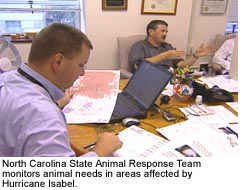VMAT members respond to Hurricane Isabel
|
Isabel did not affect livestock operations, because they had backup generators, but some North Carolina animal shelters and veterinary hospitals had problems from power outages. The North Carolina State Animal Response Team quickly helped with these difficulties and hosted numerous calls with individuals in the animal industry, emergency management, and local veterinary community to assess problems and ensure that current information was reaching all involved people. The team also issued daily reports, which they made available on the Web, and hosted a conference call with seven nearby states to assess available resources in the event they were needed. "The North Carolina State Animal Response Team handled all the North Carolina animal issues brilliantly," said Dr. Cindy Lovern, assistant director of emergency preparedness and response for the AVMA. The success of the N.C. SART's response is a confidence builder—N.C. SART is coordinating with the American Veterinary Medical Foundation to make every state ready for disasters involving animals by the end of the decade. At least 18 states should be prepared by the end of 2006. The AVMF funds the VMATs. "The most successful disaster response plan is one that has been practiced and is coordinated with the local and state veterinary communities, industry, and emergency management," Dr. Lovern said. 
| ||
 As Hurricane Isabel hurdled toward the East Coast, the veterinary community prepared to provide assistance. Veterinary Medical Assistance Teams 1, 2, and 3 were put on alert status, and the Department of Homeland Security, through the National Disaster Medical System, established three Management Support Teams. The teams, stationed in North Carolina, New Jersey, and Virginia, each contained a VMAT representative to assess animal needs in affected locations. The NDMS—a program involving civilian volunteers, private businesses, and local, state, and federal government agencies—ensures that resources and medical services are available in a disaster's wake.
As Hurricane Isabel hurdled toward the East Coast, the veterinary community prepared to provide assistance. Veterinary Medical Assistance Teams 1, 2, and 3 were put on alert status, and the Department of Homeland Security, through the National Disaster Medical System, established three Management Support Teams. The teams, stationed in North Carolina, New Jersey, and Virginia, each contained a VMAT representative to assess animal needs in affected locations. The NDMS—a program involving civilian volunteers, private businesses, and local, state, and federal government agencies—ensures that resources and medical services are available in a disaster's wake.